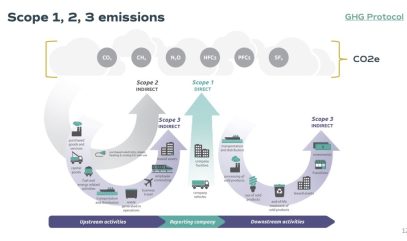Case Study #1: Water Conservation and Hopworks Urban Brewery (Post 2 of 4)
Hopworks Urban Brewery (HUB), located in Portland, Oregon, was founded in 2007 with an emphasis on sustainability from the start. Owner and founder, Christian Ettinger, grew his brewery with triple-bottom-line values guiding every decision from the brewery’s conception over the past 12 years.[1] The method in which HUB brews their beer today exemplifies the eco-design process valued by sustainable businesses. In this case, their process was designed to conserve water. As is true with all beer production, HUB uses water throughout the production process from brewing, malting, cleaning, cooling, and packaging. It is an essential ingredient in making beer and without water, the industry would be non-existent.
In 2012, HUB determined that their production process used 4.23 gallons of water per one gallon of beer (already low by conventional standards). By redesigning their entire process, purchasing water-saving equipment, and reusing water when possible, the brewery was able to reduce consumption down to 3.39 gallons of water per gallon of beer produced by 2015.[2] But this wasn’t good enough for HUB. The brewery offsets the remaining 3.39 gallons of water use through the purchase of water restoration certificates issued by Bonneville Environmental Foundation (BEF), a nonprofit dedicated to offering renewable energy certificates, carbon offsets, and water restoration certificates. According to BEF’s website, their water restorations certificates “offer a first-of-its-kind platform to help balance your business water footprint, gallon-for-gallon, and to achieve important water security, food security, and environmental benefits.” During the 2018 B Corp Leadership Development Pacific Northwest Conference in Portland, Christian Ettinger explained that working with BEF allowed his company to restore water into the same watershed in which his brewery acquired the water necessary to make his beer, creating a water neutral operation and helping to secure reliability of his supply chain into the future.
“Use the brewery as the means to change the world.”
--Christian Ettinger, Founder, Hopworks Urban Brewery
In contrast to HUB’s practices, the global beer market’s irresponsible use of water exacerbates the ever-increasing shortage of this natural resource. Currently, there are very few market interventions as it pertains to water and the beer industry, but this could change as water becomes a scarcer commodity. In 2017 the city of Mexicali welcomed Constellation Brands, an international beer conglomerate that produces most of America’s most popular Mexican beer. Mexicali government officials guaranteed the beer producer all the water they needed to produce their beer, most of which is exported into the U.S. effectively removing the water from their watershed permanently. In return, Constellation Brands promised 750 permanent jobs.[3]
The main source of water in this part of Mexico is the Colorado river, which runs nearly dry by the time it reaches the city of Mexicali. Currently, the region is using groundwater that is not recharged fast enough to keep up with demand.[4] In this case, the government of Mexicali prioritizes industry demand for water over the life sustaining needs of the people, animals, and vegetation for the local ecosystem. This practice is not sustainable and will result in either devastation to local human health or the failure of the brewery. This example illustrates a growing crisis where cities are forced to choose between industry and an equitable supply of water to their citizens.
Next, I will share how a Spokane brewer uses biologically grown landrace grains to make his beer, and why it matters.
Read Part 1 - Sustainable Beer: Two Examples from the Craft Beer Industry (Post 1 of 4)
[1]Pullman, Madeleine E, Jacen Greene, Devin Liebmann, Nga Ho, and Xan Pedisich. 2015. Hopworks Urban Brewery: A Case of Sustainable Beer. Portland: Business Faculty Publications and Presentations.
[2]Hopworks Urban Brewery. n.d. Keeping It Green. Accessed May 16, 2019.
https://www.hopworksbeer.com/p...
[3]2018. The World's Water Crisis. Directed by Joe Posner. Performed by Amina Mohammed, Betsy Otto, Arnoldo Matus Kramer, Salvador Garcia, Laura Mena Garcia and Leon Fierro Resendiz.
[4]Same as above
Read More
Protect Your Business with a Climate Action Plan
Introduction Our changing climate impacts every aspect of our lives—our economy, our communities, and the environment—in ways both visible and unseen. While scientists and environmental organizations have long recognized
Witnessing the world of sustainable business firsthand
As a young student with a passion for climate justice and sustainability, it always felt like a contradiction to pursue a degree in business. From what I had witnessed, businesses didn’t necessarily operate ethically. Mu
Interning with Purpose: My Journey with Measure Meant
From January to May 2024, I had the distinct pleasure of working with Measure Meant as an Operations Intern. As a graduating senior at Gonzaga University, I had not planned on pursuing another internship in my final seme
Measure Your GHG Emissions as a Small Business
As a small business, you may wonder why measuring your greenhouse gas (GHG) emissions is crucial. The reality is, small and medium-sized businesses (SMBs) represent over 90% of the business population, provide over 60% o




